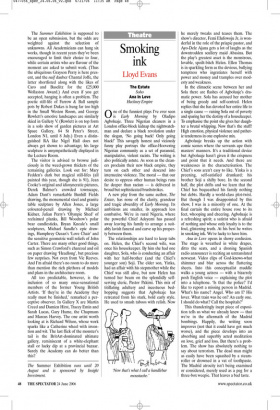Smoking ink
Lloyd Evans
The Estate Soho Ana in Love Hackney Empire One of the funniest plays I’ve ever seen is Early Morning by Oladipo Agboluaje. Three Nigerian cleaners in a London office-block kidnap the nightwatchman and declare a black revolution under the slogan, ‘No going back! Only going black!’ This savagely honest and viciously funny play portrays the office-Hoovering Nigerian community as a set of paranoid, manipulative, violent racists. The writing is also politically astute. As soon as the cleaners proclaim their new black empire, they turn on each other and descend into internecine violence. The moral — that our desire to oppress other human beings runs far deeper than racism — is delivered in broad but sophisticated brushstrokes.
A new play from the same author, The Estate, has none of the clarity, grandeur and tragic absurdity of Early Morning. Its ambitions are smaller, its approach less combative. We’re in rural Nigeria, where the powerful Chief Adeyemi has passed away leaving his family to arrange a suitably lavish funeral and carve up his property between them.
The relationships are hard to keep tabs on. Helen, the Chief’s second wife, was once his housekeeper. By him she had one daughter, Sola, who is conducting an affair with her half-brother (and the Chief’s younger son) Soji. The elder son, Yinka, had an affair with his stepmother while the Chief was still alive, but now Helen has turned her beam on the splendidly selfserving cleric, Pastor Pakimi. This mix of titillating adultery and incestuous bedhopping suggests that Agboluaje has retreated from his stark, bold early style. He used to smash taboos with relish. Now he merely tweaks and teases them. The show’s director, Femi Elufowoju Jr, is wonderful in the role of the priapic pastor, and Ayo-Dele Ajana gets a lot of laughs as the downtrodden scullery maid Abasina. But the play’s greatest asset is the monstrous, lovable, spoilt-bitch Helen. Ellen Thomas is in sparkling form as the devious, bullying temptress who ingratiates herself with power and money and tramples over modesty and weakness.
In the climactic scene between her and Sola there are flashes of Agboluaje’s dramatic power. Sola has accused her mother of being greedy and self-centred. Helen replies that she has devoted her entire life to a single cause — raising Sola out of poverty and sparing her the destiny of a housekeeper. To emphasise the point she gives her daughter a brutal whipping. Now that’s the stuff! High emotion, physical violence and pathetic tenderness in one explosive mix.
Agboluaje breaks up the action with comic scenes where the servants ape their masters’ manners. It’s a traditional device but Agboluaje hasn’t given it the crispness and point that it needs. And there are weaknesses in the characterisation. The Chief’s sons aren’t easy to like. Yinka is a preening, self-satisfied drunkard; his brother Soji a shifty bore. In the second half, the plot drifts and we learn that the Chief has bequeathed his family nothing but debts. Hardly a world-class plot-twist. But though I was disappointed by this show, I was in a minority of one. At the final curtain the entire house rose to its feet, whooping and cheering. Agboluaje is a refreshing spirit; a satirist who is afraid of nothing and whose only loyalty is to the foul, glistening truth. At his best he writes in smoking ink. We’re lucky to have him.
Ana in Love opens in showy confusion. The stage is wreathed in white drapes, ditto the seats, and a droning Spanish radio announcer is reciting an untranslated newscast. Video clips of God-knows-what shimmer and blur across the fluttering sheets. Into this conceptualist muddle walks a young actress — with a bizarrely posh English voice — explaining the plot into a telephone. ‘Is that the police? I’d like to report a missing person in Madrid. What’s his name? Angel. Who am I? His lover. What train was he on? An early one. I should do what? Call the hospitals?’ This thunderingly inept piece of exposition tells us what we already knew — that we’re in the aftermath of the Madrid bombings. Happily, the writing soon improves (not that it could have got much worse), and the piece develops into an absorbing and superbly acted meditation on love, grief and loss. But there’s a problem. The show has absolutely nothing to say about terrorism. The dead man might as easily have been squashed by a steamroller or drowned in a vat of toothpaste. The Madrid atrocity isn’t being examined or considered, merely used as a peg for a three-box weepie. That leaves a bad taste.



















































 Previous page
Previous page